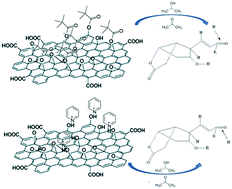Graphene oxide as a catalyst for the diastereoselective transfer hydrogenation in the synthesis of prostaglandin derivatives†
Abstract
Modification of GO by organic molecules changes its catalytic activity in the hydrogen transfer from i-propanol to enones, affecting the selectivity to allyl alcohol and diastereoselectivity to the resulting stereoisomers. It is noteworthy the system does not contain metals and is recyclable.



 Please wait while we load your content...
Please wait while we load your content...